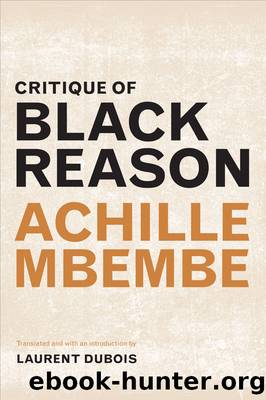Critique of Black Reason by Mbembe Achille

Author:Mbembe, Achille
Language: eng
Format: epub
ISBN: 9780822373230
Publisher: Duke University Press
Published: 2017-02-17T00:00:00+00:00
The Enigmatic Mirror
Race is at the center of this tragedy. To a large extent, race is an iconic currency. It appears at the edges of a commerceâof the gaze. It is a currency whose function is to convert what one sees (or what one chooses not to see) into a specie or symbol at the heart of a generalized economy of signs and images that one exchanges, circulates, attributes value to or not, and that authorizes a series of judgments and practical attitudes. It can be said of race that it is at once image, body, and enigmatic mirror within an economy of shadows whose purpose is to make life itself a spectral reality. Fanon understood this and showed how, alongside the structures of coercion that presided over the arrangement of the colonial world, what first constitutes race is a certain power of the gaze that accompanies a form of voice and, ultimately, touch. If the gaze of the colonist âshrivels meâ or âfreezes me,â if his voice âturns me into stone,â it is because he believes that my life does not have the same weight as his does.28 Describing what he called the âlived experience of the Negro,â Fanon analyzes how a certain manner of distributing the gaze ends up creating its object, fixing it, or destroying it, or returns it to the world but under the sign of disfiguration or at least of âanother me,â a me that is an object, a marginal being. A certain form of the gaze has, in effect, the power to block the appearance of the âthird-beingâ and his inclusion in the sphere of the human: âI simply wanted to be a man among other men.â29 âAnd here I am an object in the midst of other objects.â How, starting from the desire to be a human being like others, does one arrive at the realization that we are what the Other has made of usâits object? âAnd then we were given the occasion to confront the white manâs gaze. An usual weight descended on us. The real world robbed us of our share,â he continues.30
The final recourse of colonial racism is to dispute the humanity of this âtriple person.â The struggle fixates first on the body. For Fanon, the appearance of the third-being within the field of racism happens first in the form of a body. âAll around the body reigns an atmosphere of certain uncertainty.â Very quickly the body becomes a weightâthe weight of a âmalediction,â which makes it into the simulacrum of the void and fragility. Even before it appeared, this body was already put on trial: âI thought I was being asked to construct a physiological self,â but âthe white manâ had âwoven me out of a thousand details, anecdotes, and stories.â The body from then on is an apparently formless form that incites surprise, dread, and terror: âLook, a Negro! Mama, look, a Negro, Iâm scared!â He exists only through his inspection and assignation within a skein of
Download
This site does not store any files on its server. We only index and link to content provided by other sites. Please contact the content providers to delete copyright contents if any and email us, we'll remove relevant links or contents immediately.
Born to Run: by Christopher McDougall(7117)
The Leavers by Lisa Ko(6943)
iGen by Jean M. Twenge(5403)
Sapiens by Yuval Noah Harari(5363)
Spare by Prince Harry The Duke of Sussex(5173)
The Kite Runner by Khaled Hosseini(5161)
Machine Learning at Scale with H2O by Gregory Keys | David Whiting(4289)
Bullshit Jobs by David Graeber(4177)
Never by Ken Follett(3930)
Goodbye Paradise(3795)
Livewired by David Eagleman(3761)
Fairy Tale by Stephen King(3365)
A Dictionary of Sociology by Unknown(3069)
Harry Potter 4 - Harry Potter and The Goblet of Fire by J.K.Rowling(3054)
The Social Psychology of Inequality by Unknown(3013)
The Club by A.L. Brooks(2917)
Will by Will Smith(2901)
0041152001443424520 .pdf by Unknown(2842)
People of the Earth: An Introduction to World Prehistory by Dr. Brian Fagan & Nadia Durrani(2726)
